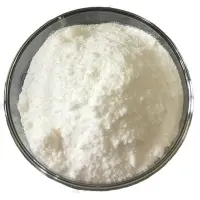The alcohol-free drug dileton inhibits cell covulsion, or can be used to block cytokine storms in patients with new coronary pneumonia
-
Last Update: 2020-05-28
-
Source: Internet
-
Author: User
Search more information of high quality chemicals, good prices and reliable suppliers, visit
www.echemi.com
May 27, 2020 /2020 /prnewswireBIOON/--- inflammation is an alarm system in which cells respond first to potential hazardsHowever, excessive inflammation can be fatalIn a new study, researchers from the Cell and Molecular Medicine Program at Boston Children's Hospital in the United States found that disulfiram, a key gatekeeper protein that is involved in inflammation, is blocked as a U.SFood and Drug Administration (FDA)-approved alcohol-fuelled drug for the treatment of alcoholismThe findings, published online May 4, 2020 in the journal Nature Immunology, are titled "
FDA-
app
roved disulfiram pyrspyrspyrsby blocking gasdermin d pore."when activated by the caspase enzyme, gasdermin D (GSDMD) is cut in half, releasing an active fragment called gasdermin-D-NT (red egg circle)These fragments gather together to punch holes in the membrane of the infected cell, causing the cell to dyslateBithavulin blocks gasdermin-D-NT fragments from forming membrane holes, thus preventing cell dysplasia and the release of inflammatory cells that cause sepsisPhoto from Xing Liu, PhD, and Sebastian Stankiewicz, Boston Children's Hospital and Youdong Pan, PhD, Brigham and Women's Hospitalactivation of the GSDMD protein is the last common step in the process of cell pyroptosis, and the resulting inflammatory cytokine release can be observed in many serious diseases, including sepsisIn this study of mice, mice treated with disulfurlun did not have fatal sepsis compared to untreated miceDr Judy Lieberman, co-author of the paper and a researcher in the Cell and Molecular Medicine Program at Boston Children's Hospital, said, "This study is very timely at this time because most people believe that the clinical deterioration of COVID-19 patients is driven by the over-release --- of cytokine storm--- inflammatory molecules." "Despite a lot of interest, there are no real GSDMD inhibitors," said Dr Hao Wu, co-author of the paper and a researcher in the Cell and Molecular Medicine Project at Boston Children's Hospital We sifted through thousands of compounds and found that the best results were one that already appeared in the market -- disemine, which is cheap, has a 70-year history of drug safety, and may soon be reused "The cascade reaction to cell inflammation when an invasive virus or bacteria into the cell, it causes inflammation, which in turn triggers a series of events One of the key events is cell dyslecity, an inflammatory cell death In cell coking, the cell membrane of the cell bursts directly, releasing inflammatory molecules such as leukocyte interleukin-1 (IL-1), which causes fever In a paper published in the journal Nature in 2016, Lieberman and Wu found that GSDMD forms membrane holes When these membrane holes are opened, inflammatory molecules overflow from the cells, causing cell coking (Nature, 2016, doi:10.1038/nature18629) too much inflammation can lead to human diseases, including sepsis, inflammatory bowel disease, gout,
type II diabetes
, cardiovascular disease, Alzheimer's disease, and lead to rare inflammatory genetic diseases "We know that GSDMD is the gatekeeper of the pathway that causes cell coking and inflammatory cytokine spillage," Wu said If we can find a compound that inhibits this particular step, it could become an attractive drug target to prevent cell dysdeath when it is not needed Dr Jun Jacob Hu, 's Dithavulon Inhibition Cell Covulation , screened more than 3,700 small molecules in Wu's lab to look for GSDMD inhibitors He found only 22 active compounds, the most important of which next, the researchers studied mice with sepsis They observed that disulfuren blocks cell coking and the explosive release of its inflammatory molecules Mice treated with diletrol survived, and mice that did not receive the drug died of sepsis within a day "There have been hundreds of clinical trials looking for drugs to stop sepsis and overwhelming inflammatory responses, but without success," said Lieberman "Sepsis is the leading cause of child mortality worldwide and causes about one third of inpatient adult deaths Lieberman added, "We hope that with this new discovery--- GSDMD, which plays a key role in the suppression of inflammation pathways--- we may actually have an effective treatment." The researchers now hope to apply these findings to COVID-19 the coVID-19 study in the program "Given that COVID-19 can produce an inflammatory syndrome that is very similar to sepsis, we want to know whether disulfuren can be used to treat patients with severe COVID-19," Wu said We know from a recent report that disulfuren also inhibits a coronavirus protease, one of the most important proteins in the new coronavirus SARS-CoV-2 that causes COVID-19 "
there are already plans to study sepsis and coronaviruses The ultimate goal is to start using dioneron for clinical trials in PATIENTs with COVID-19 "The fact is that GSDMD has such an impact on human pathology that we believe that an effective GSDMD inhibitor like disulfuren could open up many therapeutic applications," Lieberman said (Bio Valley Bioon.com) References: 1.Jun Jacob Hu et al.
FDA-approved disulfiram inhibits pyroptosis by blocking gasdermin d pore formation Nature Immunology, 2020, doi:10.1038/s41590-020-0669-6.
2.Xing Liu et al.
Inflammasome-aied gasdermin d causes pyroptosis by forming pop pys
Nature, 2016, doi:10.1038/nature18629.
3 Disulfiram inhibitsy fgatekeeper protein: Can it be helpful in COVID-19?
https://discoveries.childrenshospital.org/disulfiram-sepsis-covid-19/
This article is an English version of an article which is originally in the Chinese language on echemi.com and is provided for information purposes only.
This website makes no representation or warranty of any kind, either expressed or implied, as to the accuracy, completeness ownership or reliability of
the article or any translations thereof. If you have any concerns or complaints relating to the article, please send an email, providing a detailed
description of the concern or complaint, to
service@echemi.com. A staff member will contact you within 5 working days. Once verified, infringing content
will be removed immediately.







